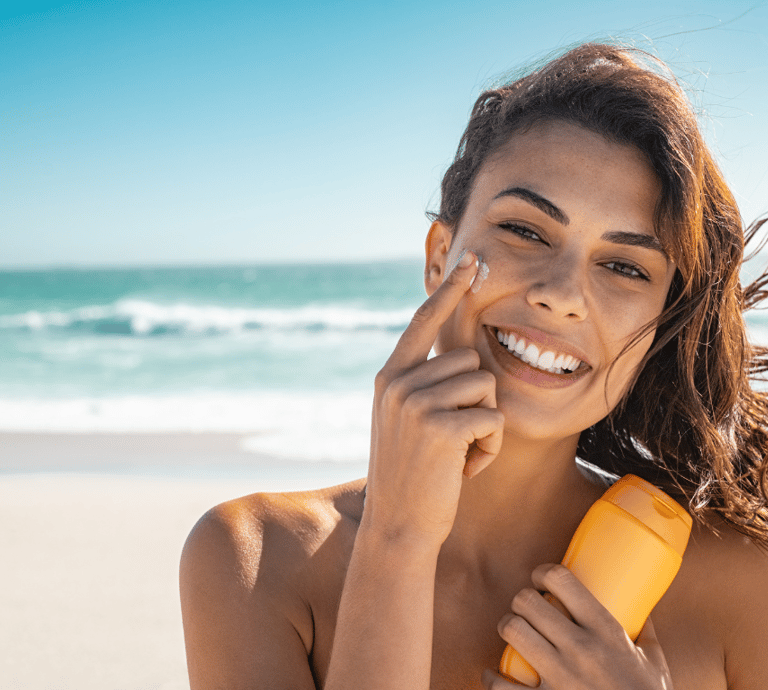Sunscreen FAQ's
Welcome to our Sunscreen FAQ! With the ever-growing awareness of sun safety, it’s essential to understand the role sunscreen plays in protecting your skin from harmful UV rays.
Whether you're a seasoned sunbather or just beginning to explore sun protection, this guide answers your most pressing questions about sunscreen—its ingredients, application tips, and how to select the best product for your needs. Stay informed and keep your skin healthy!


Shield Your Skin: Knowledge is the Best Sunscreen!
Stay Informed, Stay Protected: Your Sunscreen Questions Answered!
What is Sunscreen and How Does It Work?
What are sunscreens?
Sunscreens are topical products applied to the skin to protect against the sun’s harmful ultraviolet (UV) rays. They work by either absorbing or reflecting these rays away from your skin. Sunscreens come in various forms, including creams, lotions, sprays, gels, and sticks. When selecting a sunscreen, look for reputable brands that have been tested for safety and effectiveness.
How do I choose a sunscreen?
Choose a sunscreen with a minimum SPF of 30 to protect against ultraviolet B (UVB) rays, which cause sunburn. It's also important to select a product that offers protection against ultraviolet A (UVA) rays, which penetrate deeper into the skin and contribute to premature aging and skin cancer. Look for labels that state “broad-spectrum,” as these protect against both types of UV rays.
What is an SPF?
SPF, or sun protection factor, is a measure that indicates the level of protection a sunscreen provides against UVB rays. It represents the ratio of the amount of UV radiation that will cause sunburn on protected skin compared to unprotected skin. For example, if your skin normally burns after 10 minutes in the sun, using SPF 30 would theoretically allow you to stay in the sun 30 times longer (300 minutes) without burning. However, sunscreen should not be relied on to extend sun exposure and should be used in conjunction with other protective measures like shade and clothing.
Are there sunscreens for use during sports?
Yes, some sunscreens are specifically labeled as "sport" products. These formulas are designed to stay on the skin during physical activities, resisting sweat and water, making them suitable for athletes and those engaging in sports.
Is sunscreen safe to use?
Sunscreens are considered safe and effective for protecting against the harmful effects of UV radiation. The American Academy of Dermatology supports the use of sunscreen as part of a comprehensive sun protection strategy, which includes seeking shade and wearing protective clothing. Scientific studies indicate that the benefits of using sunscreen far outweigh any potential risks.
Are there sunscreens for sensitive skin?
If you have sensitive skin, it's advisable to test a small amount of the product on your arm before widespread use. Look for sunscreens labeled as "chemical-free," which typically contain physical blockers like titanium dioxide or zinc oxide. These ingredients reflect UV rays and are less likely to cause allergic reactions.
Are children more susceptible to developing a reaction to sunscreens?
Children under the age of two generally have more sensitive skin but can typically use sunscreen without issues. Reactions are more likely to occur due to preservatives or fragrances in products rather than the sunscreen's active ingredients themselves. Always consult with a pediatrician if you have concerns about sunscreen use for your child.
When should I put on sunscreen?
Apply sunscreen generously and evenly at least 15 minutes before sun exposure to allow the active ingredients to bond with your skin. For maximum effectiveness, apply about one palm-full for each arm and one for each leg. Reapply every two hours, or more frequently after sweating heavily or swimming.
Does a product still work after its expiry date?
No, sunscreens should not be used after their expiration date, as the active ingredients can degrade over time, reducing their effectiveness. Additionally, exposure to high temperatures (like in a hot car or beach bag) can further compromise the product.
How do I protect my lips?
Use a lip balm with at least SPF 30. There are many options available, and it’s important to reapply every hour, especially if you are eating or drinking.
When do I need to protect myself from the sun?
Protect your skin from the sun's rays between 11 AM and 3 PM, especially from late spring to early fall. The sun's rays are strongest around midday, so it’s best to seek shade or limit exposure during these hours. Remember that the risk of UV damage increases near the equator and at higher altitudes, where the atmosphere is thinner. Reflection from surfaces like water, snow, and light-colored sand can also amplify UV exposure, so take extra precautions during winter sports and outdoor activities.
Contact a Dermatologist






